#there are so many character that can interact with each other
Text
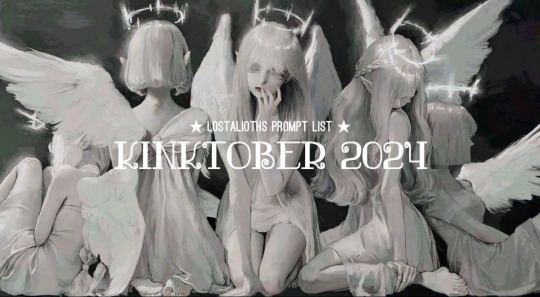
☆ hi my loves here we go with a what 3rd or 4th i don’t even know attempt at doing kinktober lmaoo. now as always i can never seem to finish kinktobers which is why i lower how many days i do as well as i pick a variety of characters to write for so i don’t get bored writing all month for the same 3-4. the same as last year i will plan on posting a fic sort of every other day so (sun, tue, thur, sat) which is why it’ll be 18 days and not 31. if you recognize any as repeats in last years kinktober prompt lists, yes i carried some over from past lists that i didn’t get to.
☆ i do not do taglists on any of my fics and kinktober is no expection however you can follow my library acc → @aliothslibrary i reblog all my fics on that account seconds after i post it, and only my fics so if you wanna be notified of my posts for kinktober follow that acc and put notifications on :) you can also search up the tag #lostalioth kinktober for all my past kinktober fics etc.
☆ MY BLOG IS 18+ MEANING MINORS PLEASE DO NOT INTERACT!! ALL OF THESE FICS INCLUDE SMUT AND EACH WILL HAVE THEIR OWN INDIVIDUAL WARNINGS.

day one → body worship + love marks w/ roommate!stucky
day two → dry humping + handcuffs w/ steve harrington
day three → high sex + bribery w/ eddie munson
day four → bondage + fingering w/ tasm!peter parker
day five → creampie + master kink w/ loki laufeyson
day six → face sitting + thigh biting w/ marc spector
day seven → piercing + cock worship w/ bucky barnes
day eight → pain kink + praise w/ dean winchester
day nine → obsession + belly bulge w/ logan howlett
day ten → overstimulation + hand job w/ sub!miguel o hara
day eleven → semi-public sex + against a wall w/ steven grant
day twelve → dacryphilia + corruption w/ perv!bsf!eddie munson
day thirteen → cock warming + begging w/ steve harrington
day fourteen → free use + primal play w/ logan howlett
day fifteen → lap dance + choking w/ mob!bucky barnes
day sixteen → edging + sir kink w/ steve rogers
day seventeen → caught masturbating + anal w/ sam winchester
day eighteen → double peneration + drunk sex w/ steddie

☆ hope you enjoy my babes!! please send me feedback, don’t be shy to comment or reblog your reactions to the days as i love seeing how you guys feel about my fics :) thankk you so much for reading and supporting my writing if you do and if you don’t for whatever reason that is perfectly fine as well!!
#lostalioth kinktober#kinktober prompts#kinktober 2024#kinktober 24#steddie x reader#steddie smut#sam winchester x reader#sam winchester smut#steve rogers smut#steve rogers x reader#bucky barnes x reader#bucky barnes smut#tasm!peter x reader#tasm!peter smut#steve harrington smut#steve harrington x reader#eddie munson smut#eddie munson x reader#steven grant smut#steven grant x reader#marc spector x reader#marc spector smut#loki laufeyson smut#loki laufeyson x reader#miguel o'hara x reader#miguel o'hara smut#dean winchester x reader#dean winchester smut#logan howlett x reader#logan howlett smut
229 notes
·
View notes
Note
Hey um, what if the Overblot boys told each other their backstories?







Mmm… Well firstly, I think it would take a lot of effort to arrive at a point where all of the OB boys would even feel comfortable being that emotionally intimate with the others. Many of the OB boys are highly guarded and resistant to putting themselves in compromising positions. For example, I can easily see Azul being paranoid that the others would use his background as blackmail; he would not risk having his own vulnerabilities becoming public knowledge. Would Leona really be okay with being sentimental in front of various people he dislikes, especially Malleus and Vil? Would Idia feel safe unpacking his trauma and grief in front of his peers? Etc, etc, etc.
Secondly, I think that even if the OB boys were hypothetically at the point where they were okay sharing their backstories with the others, it wouldn’t change much about their immediate circumstances?? The OB boys generally don’t strike me as particularly… empathetic? At least not automatically empathetic. It’s something they would need to put effort into and actively work on. I imagine that they’d otherwise just pull a Zuko-style “That’s rough, buddy” or potentially even say something tactless that rubs their peers the wrong way (for example, not fully understanding the situation or even downplaying one another’s trauma). Riddle (someone with very little to no experience with social media and entertainment mediums) might not get how being a celebrity influences Vil’s life, Leona might insult Malleus (someone whom he has a bone to pick with), everyone might still be upset with Malleus for what he did to them in book 7. etc. Each OB boy only has their own experiences as the lens through which they see and interact with the world, and it’s not that easy for just anyone to put themselves in the shoes of another person.
Hearing a (for lack of a better term) traumadump doesn’t necessarily mean you’ll connect with it or understand just how grueling it was for the person who experienced said trauma. It would usually take a significant amount of time and reflection (ideally facilitated by a licensed mediator or professional) to digest those stories in group therapy and to make sure that everyone actually understands one another. A surface-level story retelling alone in most cases isn’t (again, for lack of a better term) “enough”, especially with how self-centered, emotionally immature, and different many of the OB boys are.
Think of empathy like a skill or a muscle. It isn’t innate. You need to develop it and train it, and not putting it to use can lead to atrophy. And given how arrogant and independent your usual NRC student is… yeah, it’s definitely going to be something for them all to work on.
If you want to think of it another way, it’s like how different players will react differently to reading the OB boys’s backstories. Someone who experienced bullying similar to Azul could more easily empathize with him while also not fully “getting” the full scope of other stories they hear. Maybe they can’t understand why Riddle still cares about the mother who mistreated him. Maybe they don’t see why Jamil sacrifices so much for his family. It doesn’t make the player a bad person for not understanding all the stories, it simply means they have a limited perspective. The same is true of the TWST characters; they, too, have incomplete points of views.
Maybe knowing their backstories in advance would change some scenes in small ways (such as book 6, when they split up and then butt heads with each other). They’d know where the other boys were coming from, and how that informs how they act in present day. However, I maintain that I think not much would change from the original. In a stressful situation like book 6, they could easily slip up and say something insensitive/make assumptions about their behavior based on their background/overlook or not even consider their background in the first place since they’re so focused on the current task. For example, Azul, feeling insulted that Riddle is underestimating him, could make a snide remark that just because his mother was a control freak doesn’t mean Riddle also has to be. Jamil could still see Leona as a spoiled prince because, despite being treated like an outcast, he still grew up in immense privilege as royalty. They can so easily fixate on their own interpretations of events that it colors how they perceive others, rather than how they can relate to others no matter how similar or dissimilar their experiences were.
In other ways, I think the OB boys sharing their backstories with one another stifles potentially meaningful development. Character growth in TWST isn’t a sprint, it’s a marathon, and we’re here for the long haul. What does depositing all the backstories in their laps achieve for the OB boys? It artificially puts them in a situation to “better know” their peers rather than let it happen organically or allowing them to grow closer through their own efforts. Let’s look at the Deuce-Epel beach scene from book 5. Do you think it would have been as impactful of a scene if Epel explained his life in the countryside and how he got his traditional views on gender norms to Deuce? Personally, I don’t think so. The scene we currently have has them bonding and connecting through a shared activity (shouting at the sea), then having a heart-to-heart without a heavy backstory exposition. It’s through that, not explicit backstory sharing, that the two form an attachment and become genuine friends.
Those are all my thoughts!! ^^
#twst#twisted wonderland#disney twisted wonderland#disney twst#Malleus Draconia#Vil Schoenheit#Idia Shroud#Jamil Viper#Azul Ashengrotto#Riddle Rosehearts#Leona Kingscholar#notes from the writing raven#question#book 6 spoilers#book 7 spoilers#atla#prince zuko#avatar the last airbender#book 5 spoilers#Deuce Spade#Epel Felmier
121 notes
·
View notes
Text
I'm gonna make this post before I go in the tag and see ANY God or Diew slander, because for me the conflict this episode not only made sense, but was necessary for their relationship to move forward.
The seed was planted long ago when God first found the picture of Diew and Dr. Asshole, and at first God handled it rationally (as expected of our Green Flag King). But the longer the situation went unresolved, the more doubt and insecurity began to creep in until it all came to a head in this episode, because all God needed was honesty and openness from Diew, but Diew has learned from past conditioning to lock those parts of himself away and only show a surface level of his personality and self.
I found that God's argument with Diew, while definitely escalated by emotion and insecurity, was justified at its core. We've learned throughout this story that God's main love language is Quality Time, and that most often is fulfilled by God genuinely enjoying doing anything and everything with the people he loves, so long as they are having a good time. But his conversation with Dr. Asshole put the idea in his mind that Diew has simply been going with the flow and doing whatever God suggested in order to make him feel good, that he hasn't actually enjoyed their time together. And while we as an audience know that's false, the idea is one of God's worst fears and most devastating nightmares.
But he loves Diew and doesn't want to believe it's true, so he gives him multiple chances to prove him wrong. And when Diew continues to reply with lies and deflection, it unfortunately proves him right. Because while the context is a bit off and there is definitely a misunderstanding at play, at the end of the day Diew isn't being honest and isn't trusting God enough to open up and show him the deeper, more emotional parts of himself. So God comes to the only conclusion he can see, that even if Diew is no longer in love with Dr. Asshole, their love was deeper and more meaningful than what he has with God now.
But don't get me wrong! Even though Diew was choosing the wrong dialog options during his argument with God, he was also justified in choosing to keep his secrets and emotions hidden. What God doesn't know is that Diew HAS opened up before, bared his heart and soul to someone he thought he loved and trusted, and what was he rewarded with? Disinterest, deflection, shame. As someone with major anxieties related to human interaction, you only have to burn him once to teach him to never play with fire again. And Dr. Asshole burned him deeply on multiple occasions.
No amount of kindness and sweetness and love from God was gonna convince him to play with fire again. In fact, it was reaffirming. Much like what we have been seeing with Wan towards Beer, I'm sure Diew sees how good and wonderful God is and is absolutely terrified to fuck it up. But just like Wan, his defense became his biggest downfall.
At the end of the day, rather than focusing on what happened, we should instead focus on why it happened and how the characters are going to grow from it. And we can see that how through the characters actions during the last few minutes of the episode. We see Diew, who's defense is to isolate, actively reaching out to God multiple times in multiple ways, ready to explain and open up and heal. And we see God going through the more nasty, volatile parts of his emotions alone, so he doesn't hurt Diew while he's in the wrong headspace, but also doesn't bottle the bad things to explode later.
I think what gets me the most is that in their very last conversation before the end of the episode, Diew was asking for togetherness and God was asking for space, and they were both upset on many levels, but they were still speaking to each other with love in their tone and words.
#monster next door#monster next door the series#goddiew#misunderstandings are one of my least favorite plot devises#but this show is an example of how it can be done right and in a way that furthers and improves the story and characters
80 notes
·
View notes
Note
I have no other place to yap this to so I apologise in advance.
I find it interesting in Alhaitham and Kaveh’s voicelines they tend to talk about each other A LOT in a way of complaining. Such as in Alhaitham’s Good night voiceline where he says that he’d prefer that Kaveh wouldn’t be home at all because all the chaos and noise he makes in the dead of the night. Or in Kaveh’s Good Morning voiceline where he says that he hopes that you don't run into someone who ruins your day first thing in the morning.
I guess it’s what makes other people think that they despise each other’s company. Yet they’re always viewed as a pair and Alhaitham could’ve kicked Kaveh out of the house ages ago. But what’s your opinion on that?
Hiya! there's no need to apologise, this is a safe space for all haikaveh! When I tell you your ask is scratching my brain I mean ITCHING, I have so many thoughts about this part of their dynamic so thank you for enabling me <3 This turned out to be rather long, so I hope it’s helpful to you!
The contention in both Alhaitham and Kaveh’s character stories and voice lines seems to be to create intrigue about the two as individuals, and, in turn, their relationship.
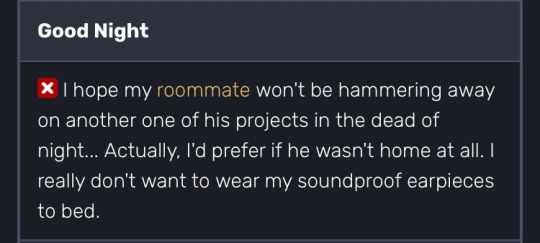

Alhaitham’s ‘good night’ voice line instantly serves as a contradiction to his character. It’s interesting, and telling, that Alhaitham, who is essentially Kaveh’s landlord, and mentions this within his fourth character story, alludes to Kaveh by using ‘roommate’ rather than ‘tenant’. ‘Landlord’ evokes a position of authority over the tenant, whereas ‘roommate’ indicates an equality between two people sharing a house – since it’s Alhaitham who advocates for the term ‘roommate’, it’s telling that, as opposed to what Kaveh believes, Alhaitham wants to establish equality between them.

In terms of what Alhaitham says in this voice line, it explicitly raises a contradiction in the form of a question: if Alhaitham is truly bothered by his roommate’s antics, why doesn’t he simply evict Kaveh?
This is relevant as this question is also posed when we initially meet Kaveh within the Archon Quest, as Kaveh states he dislikes Alhaitham’s personality, to which Alhaitham responds by saying if he bothers Kaveh so much, Kaveh always has the option to move out of the house – to which Kaveh perceives as a threat, only to then dismiss this as Alhaitham ‘changing the subject’, which seems to mean that this ‘threat’ is taken as baseless. As this isn’t called back to, this seems to be the case.


There is no real threat of eviction, and regardless of their disputes, Alhaitham ultimately gives Kaveh no ultimatum to move out. In fact, as discussed here (page 27), as we are meeting Alhaitham and Kaveh for the first time, Alhaitham allowing Kaveh to live with him contradicts his established character of living a life free of inconvenience. This instantly creates intrigue around his and Kaveh’s dynamic – who is Kaveh to Alhaitham for this exception to be made to Alhaitham’s peaceful way of life?
(An additional note of interest is that Alhaitham’s solution to the noise problem seems to be more uncomfortable than calling on Kaveh and telling him to stop his work. Alhaitham says that he’d rather not wear his noise-cancelling earpieces to bed, implying that he does so when noise is a problem at night. However, there’s no mention of Kaveh being stubborn when confronting this issue, which is why he takes to wearing his ear pieces, or any mention of confrontation at all. From this voice-line, it seems that Alhaitham avoids interaction by opting for the least comfortable option, which can be a contradiction to his character. As this is a rather brief voice-line, it’s difficult to ascertain why, but I like the idea that Kaveh is productive at night, and Alhaitham prefers not to impose on Kaveh’s work process – but this is more a headcanon than evidenced interpretation.)
Returning back to the contradiction within this voice-line, at a surface glance, this does appear to be a general complaint about Kaveh, and this can be found in Alhaitham’s lines about Kaveh, and also when discussing Tighnari. Alhaitham refers to Kaveh as ‘overly sensitive’, and ‘constantly making a fuss’.
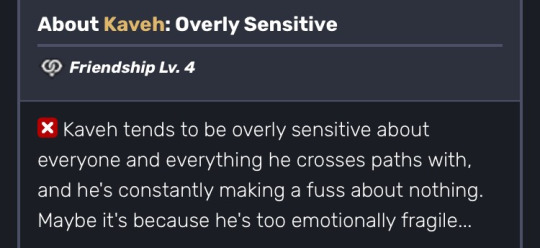
These can easily read solely as complaints, but when looking to the original CN translation, another interpretation can be found here. Alhaitham describes Kaveh as ‘caring’ or ‘tender’, which is exactly how Kaveh is described within the 3.6 special program (as per minimushiroom on twt), which can allude to how Kaveh is considerate to a fault, in that this serves as a detriment to himself.
This can be seen in Alhaitham’s other Kaveh-centred voice-line, in which he describes Kaveh buying keychains in order to provide meals for sick children, even though healthcare is free in Sumeru. Alhaitham clearly holds the view that this was a redundant action, as Kaveh, being in debt, most likely doesn’t have the money to spend on such investments that are, evidently, dubious.
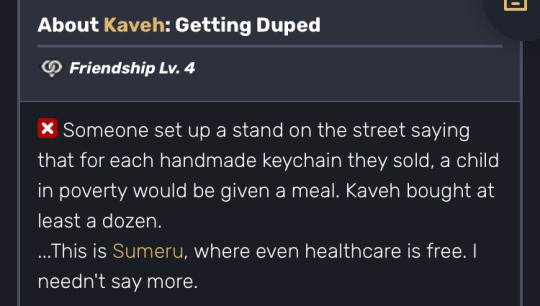
As Alhaitham provides a rational view here, this contrasts with Kaveh’s act of generosity fuelled by emotion – which highlights the contention Alhaitham has with Kaveh, in that Kaveh places himself in dangerous situations for the sake of others. However, as this can be perceived as a solely derisive line, this essential context is lacking, and can be easily misconstrued. (I think the EN translation here also coincides with this narrative, as minimushiroom notes that the original CN has Alhaitham refer to Kaveh’s sensitivity in a positive way, rather than contemptuously, as the English can be interpreted as.)
Kaveh, similarly, can be seen to complain about Alhaitham in his own voice-lines. This can be seen in the 'Good Morning' voice-line you've mentioned, where Kaveh complains about having to see Alhaitham in the morning, which 'ruins' his day. Additionally, Kaveh's voice-lines discussing Alhaitham refer to Alhaitham as ‘infuriating’ and not wanting to give Alhaitham the satisfaction of thanking him, despite Alhaitham helping him out. However, there is more nuance in these voice-lines than Kaveh simply ‘disliking’ Alhaitham, as this dislike is never stated - rather that he and Alhaitham have a difficult relationship in comparison to the ‘close’ friendship of their past.


Kaveh describes their relationship being a ‘mixed bag’, of both negatives and positives, as well as establishing a thorough understanding of Alhaitham, where other people may misinterpret Alhaitham as they ‘don’t know him well enough’. Additionally, Kaveh notes that he knows that Alhaitham can present himself in a more ‘likeable’ manner, but that Alhaitham refuses to do so, which refers to Kaveh’s contention with Alhaitham discussed within his character stories. This, in turn, generates curiosity, as it appears that Kaveh holds an in-depth knowledge of Alhaitham that the player isn’t privy to.
Referring back to Alhaitham’s ‘Good Night’ voiceline, the question raised is, if Alhaitham has a problem with Kaveh, why doesn’t he just evict Kaveh? And the answer can be found by digging further into Alhaitham’s character stories. Looking to Alhaitham’s fourth character story, it states that he is aware of the dissatisfaction Kaveh may have with their living arrangement but that ‘it matters not to him’.
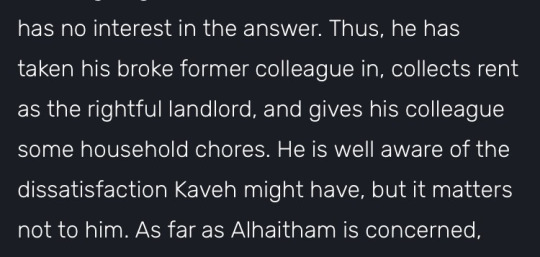
This means that he is aware that Kaveh may be unhappy with having to rely on someone else for a stable livelihood, something which his pride doesn’t naturally allow, but that this is also exacerbated due to their previous falling out and the current contentions Kaveh has with him.
At first, this can seem rather abrasive, which does fall in line with Alhaitham’s egoism as this doesn’t directly impact ‘the self’ (discussed further here), however, what immediately follows is Alhaitham’s belief that he and Kaveh are mirrors, in that his own perspective of the world will be enhanced - in the og CN, ‘completed’ -by Kaveh’s own world view.

The implication generated here with the explicit term ‘mirror’, is that, just as Alhaitham benefits from Kaveh, Kaveh, in turn, can benefit from Alhaitham. (As a side note, it is interesting then that the voice-lines in question can be seen to mirror each other – Kaveh mentions Alhaitham in ‘Good Morning’ whereas Alhaitham mentions Kaveh in ‘Good Night’.)
Returning back to Alhaitham’s character story, rather than merely reflecting each other philosophically speaking, I’d say that this also points to their respective progression as people, not just scholars.
To me, this is reminiscent of what Alhaitham says to Kaveh in A Parade of Providence – being ‘correct’, ultimately, doesn’t matter, as there is no ‘correct’ path in life, meaning that there is no ‘correct’ philosophy to shape and guide a person. Rather, Alhaitham asserts that, ultimately, their opposing philosophies are not the issue that exists between them.


The issue that does exist, then, can be surmised from Alhaitham’s actions during the event (discussed further here), in which he researches into Sachin to gauge his influence over Kaveh’s father journeying into the desert, with implicit hopes of providing closure for Kaveh, and potentially assuaging Kaveh’s guilt. This is a personal act with a personal motive; the underlying motive being concern, as opposed to an assertion of ‘correctness’.
In my opinion, I think Alhaitham’s actions during A Parade of Providence are a direct reference, and fulfilment, of Kaveh’s fifth character story. I’ve discussed here that the main reason for the ending of their friendship was them asserting the correctness of a philosophy over the other, and proposing one philosophy as the ‘solution’ to the other’s perceived flaws.
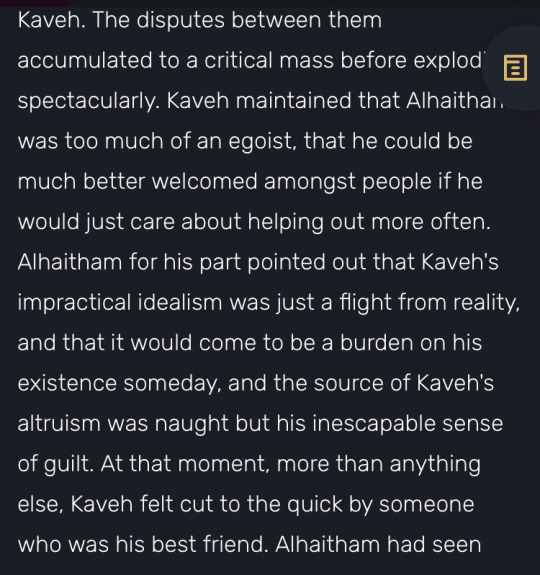

Here Alhaitham can be seen to use Kaveh’s past as the reason for his excessive altruism, implicitly referring to Kaveh’s guilt over being the supposed catalyst for his father’s demise. This final comment of Alhaitham’s appears to be the first time this has been mentioned between them, and it’s enough to be perceived as weaponisation – leading to Kaveh severing their friendship.
In A Parade of Providence, Alhaitham is shown to only have taken the role of commentator to research into Sachin, whose research we are told (by Kaveh), he has no explicit interest in, and it is heavily implied that the only reason he looked further into Sachin, was to prove to link between Sachin and Kaveh’s father. Alhaitham seems to want to absolve Kaveh of this past guilt in hopes that Kaveh will stop placing himself in the cycle of self-sabotage.
For me, when viewing this as a parallel, it highlights that Alhaitham’s motivation in speaking out during their days as students was out of concern for Kaveh, although while holding egoism as ultimately beneficial, and therefore perceivably ‘correct’. The ‘issue’ they’re currently debating is not expressly stated, and although it is unclear if Kaveh understands the implication (as discussed here), as ‘correctness’ has been overturned, there seems to be little left than the personal.
Relating this back to Alhaitham’s fourth character story, for me, Alhaitham referring to Kaveh as a mirror isn’t just referring to Kaveh as a scholar, but a person as a whole. As Alhaitham seeks to improve himself, personally, through Kaveh, it seems that he hopes to be able to benefit Kaveh in turn.
As for Kaveh’s complaints regarding Alhaitham, these can be contextualised within his own character stories. As Kaveh ultimately severed the friendship between him and Alhaitham, Alhaitham offering Kaveh to live with him, despite Kaveh revoking his previous understanding of Alhaitham (as discussed here, page 67), causes Kaveh to be overtly suspicious.
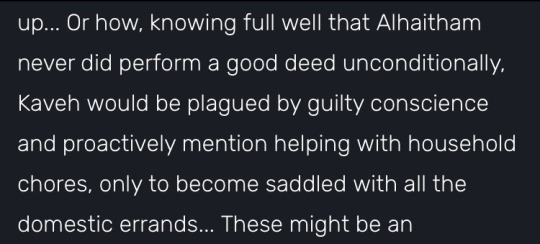
In Kaveh’s Old Sketchbook, it is mentioned that Kaveh believes there to be an ulterior motive for Alhaitham inviting him to share a house, as he believes that Alhaitham wouldn’t do something for someone else without an exchange.
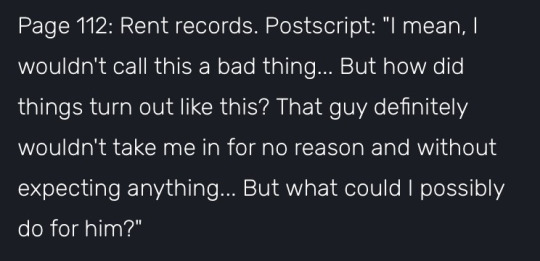
Kaveh, then, openly distrusts Alhaitham due to this unspoken motive, and although he takes on chores to ease his sense of guilt of being a perceived burden, a contention arises here. Due to their previously ended friendship, and with how Alhaitham hurt Kaveh, and how Kaveh may believe he hurt Alhaitham (discussed here), Kaveh sees no reason for Alhaitham to want him around – he treats their relationship as an exchange, asking what Alhaitham could possibly want for him.
Although Alhaitham views Kaveh as a mirror, and therefore, respects Kaveh’s perspectives, Kaveh can potentially view their opposing philosophies as a negative rather than a positive as he had done in the past (as discussed here), as it, perceivably, was what led to the end of their friendship. In this, Kaveh views Alhaitham as disparaging him and his views. As mentioned in his character story, he has no reservations in telling Alhaitham of his debt as Alhaitham has already seen through him in the past, and yet again, upon meeting at the tavern.
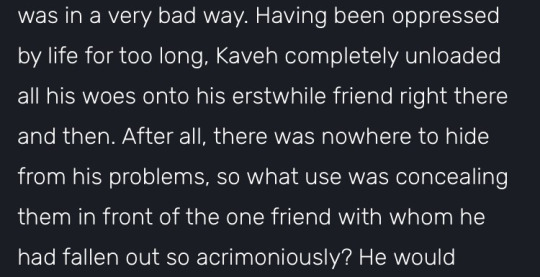
Although Alhaitham perceivably views him unfavourably, and his comments and complaints appear to propagate this interpretation, Alhaitham also seems to have no issue with keeping Kaveh around, and interacting with Kaveh, regardless of the problems Kaveh expressly has with him.
To Kaveh, it could be that as Alhaitham has already seen the worst of him, and appears to have no real issue with their stilted rapport, there is no point in donning a front and using niceties. He is open with his issues with Alhaitham, and, in turn, Alhaitham is open with him.
This appears to be a dual negative and positive for Kaveh, as he describes Alhaitham’s constancy as ‘the most unshakable part of one's past is a friend that will never change’. In this sense, his unsteady rapport with Alhaitham is reliable, and therefore, has no reason to change.

Clearly, there is a large disconnect between Alhaitham’s view of Kaveh and how Kaveh perceives Alhaitham’s view of him. As previously mentioned in the discussion of A Parade of Providence, there is an unspoken ‘issue’ between them, and this can be interpreted as dire misconceptions borne from miscommunication.
As discussed, Kaveh and Alhaitham reference each other a lot in their respective voice-lines and their character stories. This alone is enough to connect them, regardless of the cruciality of their mirror motif, as they are key figures of each other’s past, present, and seemingly, future. Despite this, it’s as you say, there’s a common perception to view them as mutually disliking each other, and, to me, this is based upon their first initial interaction, and the way they refer to each other in their own character stories and voice-lines.
It’s notable that Alhaitham refers to Kaveh in his voice-lines when Kaveh is not explicitly relevant, such as in his Good Night voice-line, and, most interestingly, when Alhaitham discusses Tighnari.

This could be because Alhaitham knows of Tighnari through Kaveh, but as this connection isn’t stated, it reads as Alhaitham mentioning Kaveh for no other reason than to complain about his perceived naivety regarding relations with others. But as this is a voice-line designated to discussing Tighnari, it’s interesting, and incredibly noticeable, that Alhaitham then discusses Kaveh instead. It’s similar to what Kaveh can be seen to do, and is observed to do by others, in relation to discussing Alhaitham.

When it comes to Kaveh, however, his complaining of Alhaitham can be seen to link with his process of dealing with troubles in his work. In his Hangout, he states that he takes his work to heart because he cares about it, which is expressed in the same quest in which Kaveh and the Traveller run into Alhaitham in the House of Daena (discussed further here, page 219).
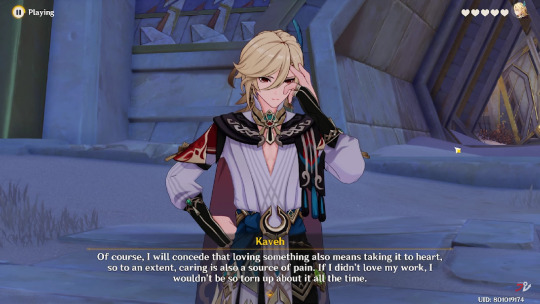
Drawing a parallel here can further contextualise Kaveh’s complaining of Alhaitham – if Kaveh truly disliked Alhaitham, there seems to be no reason for Alhaitham to remain so relevant to him, both in conversation, and in private thought. Additionally, Kaveh is described as an empathetic person, and when dealing with others, he is thusly seen to look for another perspective rather than act on his own subjective perspective.
Looking at his voice-line on Dori, for example, expresses his distaste for Dori pressuring him for Mora due to his debt, however, he also empathises with her, and states that he senses there must be a reason why Dori acts in such a way.

In contrast, this empathy can be perceived as missing in his treatment of Alhaitham, and therefore Kaveh complaining about Alhaitham can be perceived as blatant dislike – which contradicts Kaveh’s benevolence and empathy, which A Parade of Providence particularly stresses.
Kaveh’s treatment of Alhaitham can be seen as deliberately contradictory, as it can cause the player to question why Kaveh reacts in such a singular way to Alhaitham, just as why Alhaitham reacts in a singular way to Kaveh.
In reference to Alhaitham, whilst Alhaitham tends to complain about Kaveh in turn, his actions reveal him. He invites Kaveh to live with him, gives no eviction date, pays for Kaveh’s tabs willingly, (supposedly) buys wine as an apology, and goes out of his way to ensure dialogue with Kaveh – which contradicts his own character stories, in which he appears to favour solitude, and only greets those he considers his friends ‘with a nod or two’.

Moreover, Alhaitham is established as considering Kaveh a necessity to his ‘peaceful life’ he seeks to maintain (as discussed here), and can be seen to implicitly consider Kaveh one of his priorities within his Story Quest.
The idea that Alhaitham dislikes Kaveh seems to stem from Alhaitham being taken literally when voicing an opinion, or an issue, or simply joking, in reference to Kaveh – despite his character stories highlighting that Alhaitham often uses sarcasm in order to subvert expectations.

Alhaitham expressly states that he prefers to be seen as inscrutable, and unknown, by the general public, and uses subversion as a means to do so. In these character stories, Alhaitham openly encourages speculation of his own words.
Without this context, it seems easy to simplify Alhaitham to purely speaking factually when first addressing Kaveh in the Archon Quest – stating that having to explain things to Kaveh is ‘a nuisance’, and yet, it is overlooked that Alhaitham stays in the House of Daena, regardless, knowing Kaveh would find him again.
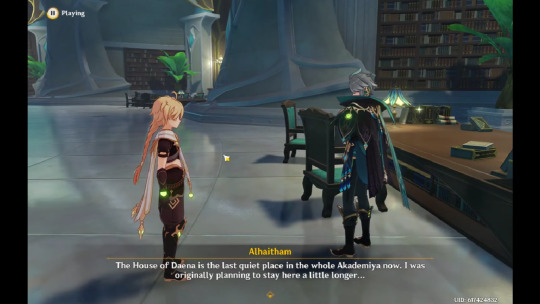
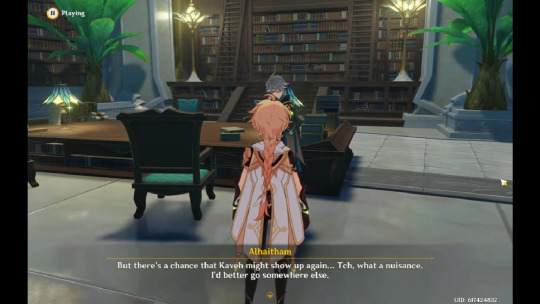
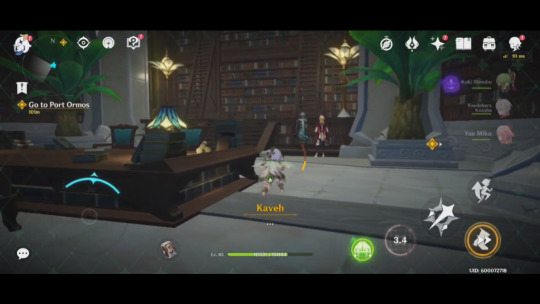
On the whole, in my opinion, Kaveh’s feelings towards Alhaitham cannot be simplified to ‘dislike’ as this is dually an inherent misunderstanding of his character, and of his and Alhaitham’s relationship, just as Alhaitham’s feelings towards Kaveh cannot be simplified to ‘dislike’ for this same reason.
In the beginning, Alhaitham and Kaveh are not supposed to be perceived as friendly, as Kaveh denies the association of ‘friends’, and Paimon describes them to the Traveller as ‘problematic’.

The reason for this is due to their character arcs being intertwined – the core issue is posed in Kaveh’s fifth character story, in that the question is raised if a compromise can be reached, if both sides of the mirror, can be balanced. At the beginning, they are entirely at odds, but even footing must be found.
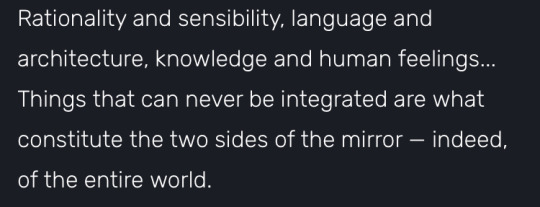
I’ve noticed a shift in online discourse after Cyno’s second story quest, as the progression in Alhaitham and Kaveh’s relationship is noticeable – deliberately, due to the flashback scene within their house (which I’ve discussed in detail here, page 122). To me, it’s more common to form the assumption that Alhaitham and Kaveh dislike each other in the Archon Quest, but with recent developments, and, hopefully, future ones, this perception is being overturned in online communities. Perhaps that’s just wishful thinking, but I’m still hopeful!
#haikaveh#kavetham#alhaitham#kaveh#genshin impact#thank you so much for your ask anon! it really ate away at my brain#haikaveh's writing is just so !?!?!? theres so many layers to peel back so a surface read of their relationship can be misconstrued as toxi#but ultimately i think these voice lines and details of their character stories are for people to question WHY they are Like That with#each other and it's one of the things i love about them that nothing is upfront or simple it really suits their themes so well#alhaitham constantly questions the world around him and flips language on its head and kaveh challenges the world with his ideals but works#with rigid principles of design and construction and he can't tell sarcasm from genuine praise which also adds to why he takes alhaitham's#words so personally... but this is improving now?? i am saying thank you cyno's second story quest <333#also the narrative that haikaveh can't stand each other seems to be more of a western thing from what i've seen online#and i think this is possibly due to the EN translation where the CN is less derisive or abrasive?#thank you to those who translate so the nuance is pointed out! <3
52 notes
·
View notes
Text
MBTIs of BBC's Merlin & Arthur Pendragon
Arthur Pendragon (ISTJ)

Introverted (I): Now I know many people see him as an extrovert. I argue he plays extroverted out of necessity. Although Arthur is often in the spotlight due to his royal position, he tends to process emotions and decisions internally. He’s reserved about personal feelings, often keeping a stoic exterior, particularly in moments of vulnerability. His introversion explains why in season 4 finale (the show only has 5 seasons), he told Merlin that Merlin was still his only friend, despite the fact that all the Knights of the Round had already been established! He clearly differentiates knights who would willingly give their lives from real friends. Arthur is so private that he doesn't even tell his wife things. In season 5, she casually said, "Arthur never tells me anything." Arthur only really lets Merlin in. (Because he loves Merlin, duh. lol)
Sensing (S): Arthur is pragmatic and focused on the present. He has a strong sense of duty and tradition, often valuing tangible results and sticking to established systems, like the chivalric code and the duties of being a king.
Thinking (T): He makes decisions based on logic and duty rather than emotions. Arthur strives to do what is right for Camelot and tends to focus on rationality when dealing with political and military matters, even if it means setting aside personal attachments.
Judging (J): Arthur values structure and order. He is disciplined, prefers routines, and is committed to fulfilling his responsibilities as a king. He can be strict, both with himself and others, expecting everyone to uphold the same level of duty.
Merlin (ENFP)

Extraverted (E): I have heard some parts of fandom say Merlin is introverted.... But Merlin has to be the friendliest, most outgoing and open character on the show! Merlin effortlessly connects with others. He’s warm, often initiating interactions with various people across all social classes, and enjoys forming deep bonds with those around him. Basically, the complete opposite of Arthur. Arthur's top knights, Lancelot and Gwaine, became knights for Merlin, because of their friendship with him! Merlin at his best is a happy, bubbly dude!
Intuitive (N): Merlin looks beyond the surface and sees potential and possibilities. He is often focused on his vision for the future, specifically the destiny he believes Arthur must fulfill, and tends to think about the broader implications of events.
Feeling (F): Merlin makes decisions based on his emotions and values. He is compassionate and deeply cares about the people he loves, even risking his life to protect them. His empathy drives many of his actions, as he is guided by his heart rather than just logic.
Perceiving (P): Merlin is adaptable and flexible. He thrives in chaotic situations, often relying on his quick thinking to solve problems on the fly. Unlike Arthur, Merlin isn't tied to structure and routine, preferring to go with the flow and adjust his plans as circumstances change.
Even being complete opposites (they don't have a single common letter in their MBTI), Arthur and Merlin's personalities complement each other in a way that makes their relationship dynamic, powerful, and balanced. Despite their differences, these contrasts are what strengthen their bond, making them effective as partners and allowing them to grow as individuals.
How their MBTIs shaped their love story:
1. Arthur (ISTJ) – Duty vs. Love
Arthur’s ISTJ personality makes him deeply rooted in duty and tradition, which often conflicts with his personal feelings. As a king-in-waiting, he’s bound by the rules and expectations of Camelot. This sense of responsibility prevents him from openly expressing his affection for Merlin, a commoner and servant.
Suppressed feelings: Arthur’s introversion and thinking function push him to hide his emotions, especially his care and affection for Merlin. His loyalty to his role as prince often conflicts with his deeper, unspoken feelings for Merlin. Arthur’s rational side forces him to focus on the kingdom, keeping his emotions hidden beneath his duty to the crown.
Traditional values: As an ISTJ, Arthur’s sense of tradition keeps him from crossing the boundaries of class and status. His love for Merlin, if fully acknowledged, would defy these societal norms, and his reluctance to embrace that love fully reflects his fear of breaking those structures.
2. Merlin (ENFP) – Love as a Driving Force
Merlin’s ENFP personality is more openly emotional and driven by personal values. His feeling and perceiving traits allow him to express affection, even though it’s subtle and often masked in humor or banter. Merlin constantly shows his love and devotion to Arthur by risking his life to protect him and ensuring Arthur’s destiny as king.
Boundless loyalty: Merlin’s deep emotional attachment to Arthur is clear, as he constantly sacrifices his own desires, hiding his magic and risking his safety to ensure Arthur’s survival. His ENFP idealism drives his belief in Arthur as the Once and Future King, and this belief is tied deeply to Merlin’s personal love for him. The idealism of an ENFP is evident in how Merlin sees the bigger picture of Arthur’s destiny but is also fueled by his personal love and emotional bond.
Unconditional care: While Arthur struggles to show emotions, Merlin’s extraverted nature makes it easier for him to express affection through acts of service. He remains unwavering in his commitment to Arthur, which highlights the ENFP’s ability to love deeply and unconditionally, even when the other person may not fully reciprocate outwardly.
3. Their Banter – The ENFP vs. ISTJ Communication Style
The teasing and banter between Arthur and Merlin highlight their different communication styles. Merlin’s ENFP warmth and humor frequently bring out Arthur’s softer, more human side. Arthur’s ISTJ personality makes him reluctant to openly express affection, so their teasing and sarcastic exchanges become a way to communicate affection indirectly. The playful insults act as a cover for their deeper bond.
Arthur’s respect for Merlin grows over time, despite his reserved demeanor, and Merlin’s ability to challenge him emotionally helps Arthur soften. Their banter is more than comedic relief; it shows how they communicate their care for one another in a way that feels safe and acceptable.
4. Trust and Emotional Vulnerability
Arthur (ISTJ) is slow to trust others with his vulnerabilities, given his reliance on structure and duty. But over the course of the series, he opens up to Merlin more than anyone else, showing a side of himself that he hides from everyone, including his wife and family members (like Morgana and Uther). Merlin’s warmth and loyalty gradually create a space where Arthur can be emotionally vulnerable.
Merlin (ENFP), in contrast, is more expressive and emotionally open from the beginning. His challenge lies in getting Arthur to see past his role as a servant and accept him as an equal in friendship—and potentially in love. Merlin consistently puts Arthur first, and Arthur, in return, eventually trusts Merlin above all others, including knights and advisors.
5. Protectiveness and Sacrifice
Arthur’s ISTJ sense of duty makes him protective of those he cares about, even if he doesn’t vocalize it. His actions speak louder than words, as he consistently risks his life for Merlin. This protectiveness is a manifestation of his deep, unspoken love for Merlin. However, Arthur often couches these actions in the context of duty—saying he would do the same for anyone in Camelot—when, in reality, Merlin holds a special place in his heart. He was about to abort a mission, causing hundreds of deaths, all for Merlin. Also, in one scene, as they were fleeing from a monster, Merlin fell and Arthur went back for him, a mere "idiot" servant. In that same scene, a knight fell (knights are the bread & butter of Camelot), but Arthur just kept running with Merlin....
Merlin (ENFP), with his focus on emotions and the bigger picture, sacrifices everything for Arthur. His feeling-based decisions make his love for Arthur a central motivation for everything he does, even if it means hiding his magic and true self. This constant self-sacrifice for Arthur’s sake is a key expression of Merlin’s love, a classic ENFP trait—giving up his own needs for those of someone he cares deeply about.
6. Destiny and Fate – The ENFP Belief in Idealism
Merlin’s ENFP idealism sees Arthur as not just a king but the Once and Future King, destined to unite Albion. This belief in Arthur's potential drives Merlin’s unwavering devotion, and his love for Arthur is inseparable from his belief in their shared destiny. Merlin’s visions of a better future are rooted in his love for Arthur, and it’s his idealism that keeps him fighting for that future.
Arthur (ISTJ), being more grounded, is less concerned with abstract concepts like destiny and fate at first, but over time, Merlin’s unwavering belief in him helps Arthur grow into the king Merlin always knew he could be. Arthur begins to rely on Merlin’s intuition and instincts more and more, eventually embracing the destiny Merlin foresaw for him. Though Arthur may not openly express it, he comes to understand that Merlin’s faith in him is born out of deep love.
7. The Final Goodbye – An Emotional Climax
The emotional 'I love you': In the final episode, Arthur’s ISTJ stoicism breaks as he finally acknowledges the depth of his bond with Merlin. When Merlin reveals his magic, Arthur is hurt and betrayed at first (typical ISTJ reaction to broken trust), but eventually, he softens, realizing that Merlin has been protecting him all along. In his final moments, Arthur shows his vulnerability, thanking Merlin for everything—a rare moment of emotional openness for him. He simultaneously mouths 'I love you.'
Throughout the series, Arthur’s ISTJ sense of responsibility made it difficult for him to prioritize his personal feelings over his role as king. But as he faces death, duty and love become inseparable. His final act of trying to kiss Merlin shows that, even though he had been bound by the expectations of the crown, in his last moments, his love for Merlin overrides those constraints. His inability to express affection easily is part of his ISTJ personality, but in his final moments, he sheds that restraint, finally allowing himself to express what he’s likely felt for a long time. For Arthur to mouth 'I love you", even silently, is monumental. It’s a complete surrender of the emotional guard he’s maintained, signifying not just love but trust, vulnerability, and a breaking of the social norms and responsibilities that have constrained him. The fact that he chooses to say it at the very end shows that he always cared deeply for Merlin, but only now, when there’s nothing left to hold him back, can he express it.
Arthur, having always struggled to communicate his feelings, finally mouths the words "I love you" when it’s too late to make a difference. This is reflective of his ISTJ personality—he needed to be pushed to the very brink of death before he could allow himself to be emotionally vulnerable and express his love. The timing makes this moment all the more tragic because Arthur had to die before truly opening up.

The almost-kiss: Arthur’s instinct to pull Merlin in for a kiss reflects the ISTJ desire to do things physically, practically, and decisively, even in the most emotional moments. It also shows how Arthur, who had been in control of so much of his life, wanted to take control of this final expression of love. Yet, his inability to complete the kiss mirrors his inability to fully express his love for Merlin throughout their time together—blocked by the weight of his responsibilities as king.

For Arthur, to attempt to kiss Merlin in his final moments is a gesture of complete vulnerability. An ISTJ like Arthur rarely breaks emotional barriers, but in this moment, he lets go of everything—the crown, his duties, his stoic exterior—and reaches for the person who has always been there for him. It’s the ultimate sacrifice of his own emotional walls.
Arthur’s attempt to kiss Merlin shows that he is finally willing to defy the traditions and expectations that have held him back for so long. As a prince and then a king, he was expected to follow societal norms, but in his final moments, he’s free of those chains and can express his love for Merlin without fear of judgment or duty holding him back. The kiss is the ultimate acknowledgment of the love he had hidden behind his royal duties.
Throughout the series, Arthur has hidden his true feelings for Merlin behind duty, status, and responsibility. His inability to express affection easily is part of his ISTJ personality, but in his final moments, he sheds that restraint, finally allowing himself to express what he’s likely felt for a long time. As he faces death, duty and love become inseparable. His final act of trying to kiss Merlin shows that, even though he had been bound by the expectations of the crown, in his last moments, his love for Merlin overrides those constraints. Arthur, true to his ISTJ nature, often preferred action over verbal declarations of emotion. By attempting to physically pull Merlin in for a kiss, Arthur shows that his love for Merlin transcends words—it's something he feels deeply and wants to express through connection, even when he doesn't have the words to say it outright.
Merlin's internal turmoil: As an ENFP, Merlin had always worn his heart on his sleeve, even when his love for Arthur was expressed through loyalty, service, and protection. The fact that Arthur finally mouths "I love you" just as he's dying would shatter Merlin’s heart, as it represents the culmination of everything Merlin had been hoping for but never dared to fully expect. Merlin, the dreamer and idealist, had believed in Arthur’s greatness, and now, in this moment, Arthur’s love is revealed, only for it to be taken away immediately in the "bury (or kill) your gays" trope.
For Merlin, the attempted kiss is heartbreaking because it represents the closeness and intimacy they could have had if circumstances were different, as Merlin said, "I always thought if things had been different, we'd've been good friends." ENFPs, with their emotional expressiveness, seek connection and intimacy in their relationships, and Arthur’s attempt to kiss him in his final moments is a bittersweet acknowledgment of the love that Merlin had always known was there, but could never be fully realized. The fact that they were so close to expressing that love makes the loss all the more devastating for Merlin.
A Tragic Love Story Cut Short
The final scene where Arthur mouths "I love you" and attempts to kiss Merlin before dying is the ultimate expression of their hidden, unspoken love. Arthur’s ISTJ personality, which had kept his emotions guarded for so long, finally breaks, allowing him to express his true feelings. Meanwhile, Merlin’s ENFP nature, always driven by emotion and idealism, is left devastated by the cruel timing of this revelation.
Their MBTI types add layers to this tragic love story. Arthur’s love, expressed at the very end, shows how hard it was for him to balance duty and emotion, while Merlin’s eternal grief reflects the ENFP’s idealistic belief in love, crushed by the harsh reality that they were too late. Their love was always there, simmering beneath the surface, but in the end, fate allowed only a fleeting moment of acknowledgment before tearing them apart.
After Credits/The Once & Future King:
1. Merlin’s ENFP Hope and Eternal Longing
Driven by Idealism: Merlin’s ENFP personality is defined by hope and idealism, traits that keep him believing in Arthur’s eventual return. Even though Arthur died, Merlin’s unwavering belief in the prophecy—that Arthur will rise again—fuels his determination to keep waiting. For Merlin, his love for Arthur and his faith in the prophecy are intertwined, so he continues to hold onto the belief that their story isn’t over.
Endless Loyalty: ENFPs are known for their loyalty to people they care deeply about, and Merlin’s waiting for over 1,500 years is the ultimate expression of that loyalty. He never moves on, because his heart and soul remain connected to Arthur, and he believes that their bond transcends death and time itself.
Living in Grief and Hope: As a feeler, Merlin experiences the full emotional weight of Arthur’s loss, but his belief in Arthur’s return sustains him. The fact that he has to wait so long makes his grief even more intense, but the hope that Arthur will rise again keeps him going, even after centuries of loneliness. His ENFP nature ensures that his love for Arthur never fades, and he continues to hold onto the possibility of their reunion.
2. Arthur’s ISTJ Rest and Duty to Return
Waiting for the Right Moment: Arthur’s ISTJ personality means that, even in death, he is waiting until the precise moment when he is needed most. His sense of duty to Camelot and to Merlin persists, even after death, as he waits for the time when his kingdom—or Merlin—truly requires him. The prophecy reflects Arthur’s ISTJ nature, as he will return to fulfill his duty, not a moment too soon or too late.
Faith in Merlin: Even in the afterlife, Arthur’s deep trust in Merlin remains. Although he is resting, there is an unspoken understanding that when he rises, Merlin will be by his side, just as he always has been. Arthur’s loyalty and sense of responsibility mean that he trusts Merlin to carry on until the moment of his return.
The Final Act of Duty and Love: Arthur’s rise will be his final act of duty as king and as a friend and lover. His ISTJ sense of purpose and structure drives his eventual return, knowing that Merlin and the kingdom will need him again. When he does come back, it will be out of love for Merlin and a deep sense of responsibility to his people.
3. A Love That Survives Time
Merlin’s Endless Vigil: For over 1,500 years, Merlin has waited, watching the world change, but his love for Arthur remains constant. His ENFP personality clings to the belief that the prophecy will come true, and when Arthur finally returns, it will be the culmination of centuries of waiting. Merlin’s idealism, rooted in his deep emotional connection to Arthur, sustains him through time. He doesn’t seek out other connections because, in his heart, Arthur is the one he’s waiting for.
Arthur’s Timeless Love: Even though Arthur is resting, his love for Merlin isn’t diminished by time. When he returns, his ISTJ loyalty will kick in, and he will fulfill his promise—coming back to be with Merlin and to save the kingdom when it’s needed most. His return is not just a matter of destiny, but also a testament to the bond he shares with Merlin, one that surpasses life, death, and time itself.
4. The Ultimate Reunion
The Prophecy Fulfilled: When Merlin and Arthur finally reunite after over a millennium, the moment will be one of overwhelming emotional release for both. Merlin, with his ENFP emotions, will have spent centuries holding onto hope, and Arthur’s return will be the answer to his deepest longing. The reunion will allow Merlin to finally let go of the grief he’s carried for centuries, knowing that Arthur is back by his side, just as he always believed he would be.
Arthur’s ISTJ Return to Duty: Arthur’s return will be a moment of intense duty and purpose, but also of love. His ISTJ nature ensures that he will rise again when Merlin (the last remaining piece of Albion) needs him most. Their reunion will be both the fulfillment of a prophecy and the completion of their love story.
5. Symbolism of Eternal Love
Waiting as a Form of Love: Merlin’s long wait for Arthur shows that love isn’t confined to one lifetime. His waiting is a manifestation of his deep, undying love, and it reflects the ENFP’s capacity for emotional endurance. Even though he’s spent centuries alone, his heart remains tethered to Arthur, and when Arthur finally returns, it will be a moment of profound emotional catharsis.
Arthur’s Duty Transcends Time: Arthur’s ISTJ sense of duty extends beyond the grave, showing that his bond with Merlin is eternal. His return will not just be about fulfilling his destiny as king, but also about being reunited with Merlin, the person who has always been by his side. This reunion will be the ultimate proof that their love and duty to each other cannot be broken by death or time.
Conclusion: A Love That Defies Time
The prophecy of Arthur’s return turns their story into an eternal love saga. Merlin, driven by his ENFP idealism and emotional depth, waits for centuries, believing in the prophecy and holding onto the love he has for Arthur. Arthur, waiting in Avalon, as the prophecy foretold, remains loyal to his duty and his love for Merlin, waiting for the moment when he is needed most.
When they are finally reunited, it will be a moment of ultimate emotional release, where centuries of love, hope, and loyalty finally come together. Their story is one of timeless love, with their bond surviving beyond life and death, waiting to be fulfilled in a future where they can be together once again.
#merthur#merlin#arthur pendragon#bbc merlin#merlin bbc#enfp#istj#MBTI#even tho i personally dont believe in MBTI anymore! its still fun to do!#merthur almost kiss#merthur i love you#merthur is canon#check my merthur is canon tagggg
42 notes
·
View notes
Text

one of my favourite frames from the comics i drew
everytime i see it i can't help laughing bc look at this range of emotions
1. tighnari absolutely refusing to react to cyno's jokes in any way
2. collei dying of cringe shinji style
3. albedo's just :D "i think i found the gold i've been looking for"
4. paimon's still processing what the hell was the joke even about
5. lumine is done with this shit, she had enough in the desert
6. sucrose is discovering new sides of albedo and questioning her admiration for her mentor
#genshin impact#fanart#genshin fanart#tighnari#collei#albedo#cyno#paimon#lumine#the traveller#sucrose#that event was so fun#so many characters interacting with each other#hope we get something similar soon#lyney albedo heizou and cyno would be unstoppable#can you tell i really like albedo btw
297 notes
·
View notes
Text
purely fanon jason vent below so feel free to ignore
every other fic in the jason todd tag whether its romantic or platonic or whatever just has to include something about the no kill rule or him giving up killing like is it not enough ! have we not hashed out this argument enough already ! can I not read some jason content without having to be randomly bombarded by the morality police and how “oh jasons not killed anyone for x amount of months thats great! we knew u could do it jay”
and I wish I was just joking like I really do but I have scoured the tag almost from top to bottom and it always, without a doubt, has to come up at some point. its his fucking defining character trait apparently. mind u he’s not even the only dc character that kills but yall just won’t let it go! I do not need jason giving up his stance on killing to be written out for me to be able enjoy content about him
and whether its included so that his relationships with other characters can be viewed as ‘realistic’ is just so. what does it matter. its already fan-fiction who the hell cares about justifying the universe that you’re choosing to write him in
#jason todd#dc#red hood#dcu#pls do not interact if u have issues with jasons stance on vigilantism or whatever bc this is rlly not my point#idc whether u hate him for it or not to each their own#I just wish it wasn’t treated as some sort of stain on his character that needs to be addressed in every fic he appears in or else he —#cant be liked or something#like thats a topic that has to be addressed for my love of jason todd and his character and the love other charas have for him to be valid#its giving ‘jason u cannot be loved the way that u are’#and this reiterates the point I made in a previous post about how ppl genuinely dont know how to perceive this conflict and its resolution#the other way around#and how bc of that its always jason who has to be portrayed as making amends or taking a knee#there are so many interesting facets to jason todd so why does it always have to circle back to this one thing#why is it that hes one of the only charas ive seen where a certain plot point can never be looked past when enjoying him in fandom
109 notes
·
View notes
Note
congratulations on the follower milestone aahhh!!! well deserved—even if im a little biased and have a potential 4 mcs for different on/off personality combos ajdjandna
as for the prompts… could i ask for number 48, “I told you to take care of yourself,” with T/H?
"I told you to take care of yourself."
Is that really the first thing they're going to say to you?
"It is, considering how the last time I saw you, you were already running a low fever."
You didn't even realize you were speaking out loud. They sigh and set the plastic bag they were holding down on your bedside table. Sitting down on your mattress, they fix a stern gaze on you. "I thought we agreed that you wouldn't shoulder things on your own anymore."
You look away to avoid their judgement. You feel your cheeks heat up even more on top of the fever. "I didn't think I'd get this sick. And I've been through worse." You can't help the pout that forms on your lips. Maybe being sick has left you with no filter to hide your true thoughts.
Their eyes soften but there's still a hint of sadness in it. "Imagine my shock when I got a text from O saying you almost passed out during a shoot," They reach out and place the back of their hand on your forehead. You lean into the cool touch instinctively. "And you're still burning up. You have to know when to take a step back. If not for yourself, then for me."
"For you?" You whisper softly.
Their heart clenches at the sight. If it's your watery eyes or the way your voice wavers with emotion, they don't know. They pull back their hand and you whine a little at the loss. "Yes, for me. After all, we're both pretty shit at taking care of ourselves for our own sake. Might as well do it to keep each other from worrying too much."
You don't reply right away. You take a deep breath, but it comes out a little watery and a little strained. You'll blame the fever for it. "Okay. I'll try to do better next time."
For the first time since they've arrived in your apartment, they smile. "That's all I ask for," They reach for the plastic bag and pull out a few things. A bottle of lemon tea, cooling patches, and cold medicine from what you've managed to see. "Is there anything you want me to get you?"
You think for a moment, trying to push through your fuzzy mind. Eventually you reach out for their hand. "Stay with me? Until I fall asleep again."
They smile again, leaning forward to kiss your warm cheek. "Of course. I'm not going anywhere, I'll be here even when you wake up."
You close your eyes and fall back on your bed, sighing with contentment. There's still so much the two of you need to work on in your budding relationship but each day is always a small step forward.
And that alone is enough.
#snippets#bridging the gap if#interactive fiction#if wip#choice of games#choicescript#hosted games#character: t/h#im still trying to figure out other names to call them since it feels weird to me to use t/h everytime lol#ahhhhh you have so many mcs!!!#each playthrough should be a little different with all the variables i'm planning on putting in#here's to hoping i can actually achieve that
25 notes
·
View notes
Text
“you didnt know what you were guarding?”
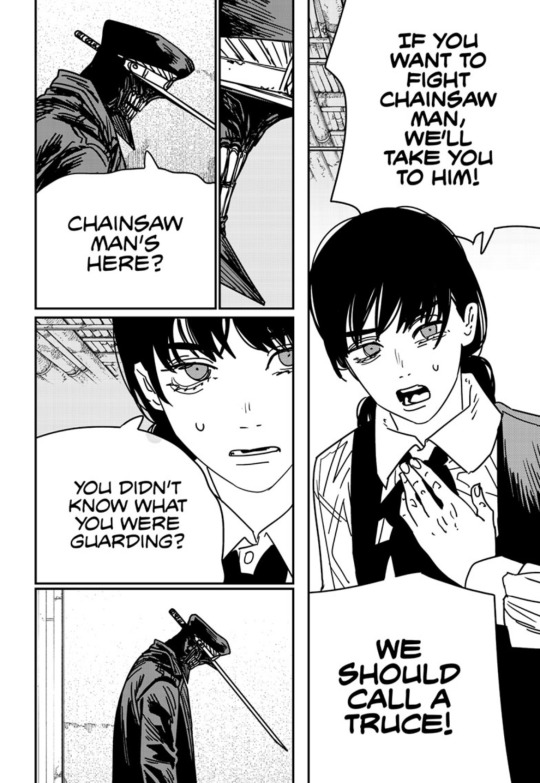
what if i said that blind faith. or blindness to others actions and intentions. or something along those lines is a hugeee theme of part 2 (not that it wasnt in part 1) and fujimoto is constantly reinforcing it!!! in part 1 i feel like instances were more intentional (ie makima manipulating everything to destroy denjis happiness and denji going along with it because he didnt know any better) whereas in part 2 we see a lot of characters (like katana man here) who were just pushing forward blindly. the chainsaw man church kids not really knowing the extent of fami’s plans. sugo just going along with the other hybrids and then trying to justify why burning down the building was right to denji. even asa in the most recent chapters as we can see how like fami and more particularly yoru convince her of a truth for their own ends. like everyone here is blind to what anyone else in the story is trying to achieve and how it might affect them!!! and in this instance with katana man, we can see how he’s actually been working against the goal that his “heart beats for” because someone else told him to do it and withheld their true intentions from him. this (plus all the stuff about blindly following goverment or religion) really is shaping up to mold fujimotos ideas about human connection and relationships from both parts in really interesting ways!!!
#chainsaw man#csm#chainsaw man manga spoilers#csm 160#spence.speaks#i just loveeee the ways that fujimoto has characters interact with each other#like. it all means something.#and the bottom line of this manga is love. and everything else that happens is a question about#how that love can go on!!!#or at least stay realistic when so many people have their own motives and could care less about hurting each other#and just to circle back to part 1#there it felt like evryone was blind to makima and her intentions#but in part 2 everyone is blind to each other!!!#anywayssss
44 notes
·
View notes
Text
i wanna post my skip to loafer art but i cant do it knowing ppl are gonna put it on tiktok and pinterest bc itd be like. bringing an invasive species ykwim
#my meds just kicked in so im feeling talkative but truly idk how to explain it#its like. with anything else id be more than happy to introduce it to ppl like monkie kid and mp100. witch hat maybe but its personal to me#but skip to loafer is special to me. and i feel bad for saying this bc other ppl do deserve to watch smth they will enjoy#hell the reason i got into it was bc my friend was kind enough to lend me her copy and i got hooked#its so ironic im saying this esp given how insecure i am abt depicting characters wrong. but i really dont want to look thru the tags#and see them on a 'can i copy your homework' tier list. or ppl getting mad abt why egashira mitsumi and shima cant just be a throuple#its just!! i wont stop you if thats how you like to engage with the show or how you interpret it bc ill just ignore it and leave u alone!!#and theres no objective wrong way of doing it!! and i know that interacting with the work is what forms a community after all!!#but keeping it tight knit is just easier for me bc nobody has to worry abt making each other laugh and we can enjoy it for what it is#fully aware im saying this as someone whos drawn monkie kid art with text post memes and owl house draw the squad templates#but at the same time i just. dont want to explain myself or give ppl reasons why shima and mitsumi are ace coded just bc it 'feels right'#fandom is a communal thing and it feels so hypocritical thinking this. too many conflictng thoughts that idk what to act on#yapping
42 notes
·
View notes
Text

I'm so giddy about the way they decided to re-introduce Elena's character in the new trailer because I was worried at the idea they would take the route of doing what the fandom (who don't read the novels) mostly perceive her with: a comic relief due to her klutzy tendencies & her crush, who constantly need to be hand-held by the boys in the group to the point the fandom interpreation render her as a shy or genki girl/ almost swap her personnality with other female characters as if she was a blank state.
But the devs instead decided to follow throught how she was depicted in the compilation: A flawed, fierce, unapologetic woman from the slums coming from an emotionnally distant family, who was the top student of military school while working in a bar in Wall Market prior joining the Turks ( who used to belittle her all the time, mind you) for the sake to gain people's approval, to prove that she's better than her sister and doesn't hesitate to beat up & torture people in front of their sickly relatives. her gung-ho attitude create a mutual frustration in the group, even Tseng doesn't really get an hold on her.
She also can be competent as she was the top student of the military academy but also did some significant contributions post-OG: She is the one who managed to have Midgar's population mostly evacuated post-Meteorfall, she is the one who goes to ask questions to people during investigations, she is the one who maintain a cordial relationship between the towns around Healen's Lodge by proposing & organizing the distribution of medicine to Rufus & then goes looking for the materials & employees necessary for its production. She is the one who find the Jenova's remains in AC & get them to Rude & Reno before going back to fight the remnants to help Tseng. She was in OG the Turks with the most powerful stats as well.
She's not a character you can swap with Cissneï (like some people apparently hoped?) We don't get to skip or not her boss fight this time. She is re-introduced as her class of origin: a martial artist (instead of giving her a gun like in AC). She is an actual threat & even Rude this time warn the party about it. Which I hope will be kind of omnimous story-wise as I think Avalanche & the Turks may become more & more aggressive toward each other throughout the story.
I think we're also gonna see interesting dynamic in the group, as since she's the newbie with an inquisitive & active side, she may be the player eyes into the dynamics & conspiracy in Shinra.
I also think it's the first time we see a Turks get that violent with Aerith & we know that Reno, Rude & Tseng cares about her. Among the group, the one who is never show feeling sorry about being a Turks is Elena.
I hope Rebirth will finally bring justice to her, with her qualities & flaws. She is as important as her comrades within the structure of Shinra & I want it to be explicitly acknowledged in the story.
#ff7#elena#elena ff7#ff7 rebirth#ff7 remake#compilation of ff7#ppl whining abt she's physically similar to Tifa is half-funny#half-annoying#bcos they are likely not aware of how many parallels can be done between these two characters as they share many similarities#while clearly being different ppl. So them looking like each other add even more to that. Elena is almost like a dark mirror.#& SE has the usual problem of designing female characters like dolls#but eh#i guess that mean she should be considered as really pretty in-world since Tifa is already seen as being super beautiful#also hoping we get to see her directly interact with Rufus this time#bcos they could have such an interesting relationship due to their upbringing & motivations. They are really alike in a way.#added to that she's the first Turks who got promoted during his own presidency.#cb's rambling
118 notes
·
View notes
Text
Since pretty much everyone who's watched Spies Are Forever (myself included) enjoy seeing Curt and Joey act opposite each other in other works as well, and since the Hatchetfield productions give us a lot of different character combinations for them, I was curious which character combinations people find the most interesting. This isn't intended to necessarily be about shipping, but just what duo you like having interact with each other the most, either from what's been released so far or potential future character interactions.
#starkid#hatchetfield#curt mega#joey richter#I usually just tag for archival purposes and not so others can find things please help/I apologize?#anyway I'm just really interested in knowing what people think since I know 99% of SAF fans love when the two are in other things together#like I said am I very much a part of that group#but while in things like Headless or Wayward Guide or Poe Party and so on they don't generally play multiple characters#the Hatchetfield shows give us lots of interesting dynamics and I wanna see what people like#tried to add as many canon interactions + the conceptual duos I personally found most interesting#but if you think something like Kyle and Brad from Yellow Jacket interacting with each other is the most interesting then great + go for it#also spoilers for Time Bastard Working Boys and NPMD I guess?#oh and Hatchetfield Ape Man spoilers
32 notes
·
View notes
Text
Discussing the NCR (Fallouts NV's Military Industrial Complex)
Fallout regularly discusses the idea of the military, its faults, its strengths, and most importantly, the psycho-social aspects of it regarding those who are members. We have seen a direct critique of the military generalized through the Enclave's overt nationalism, the hoarding of resources and indoctrination through the Brotherhood of Steel, and an almost eerily modern critique of the whole military-industrial complex through the NCR in New Vegas. In these series of posts, I will be focusing primarily if not exclusively on the last one.
The NCR we see in the game is strictly the military side of things and the depiction of active occupation during a time of eminent war, conflicting factions, and resource scarcity. It is in this we are missing a major factor that negatively affects the view of the NCR in the game and out: Civilian life along with citizen opinion on the military. While we do get Mojave civilian opinion on the military (often neutral or negative) we do not get those who are New California Republic citizens, not those who actually discuss the military more so not understanding the importance of the occupation and the President's choices.
We do not see how life is regularly lived by the average citizen as we have not seen New California in New Vegas, though, we get words and glimpses that the people are relatively content in the growing country minus the fact many people are not happy with the choice of encroaching on the Mojave. This most similarly reflects it's real-world application that many civilian citizens reject acquisition and war due to the economic effects it has on the country and the general violence/loss associated.
In this, we come to an issue of losing a perspective that is unique to the NCR as a military representative. The Brotherhood is notably a place where its active members are intertwined with its efforts, the young are raised to be scribes, paladins, etc... To where even if one is not fighting for The Brotherhood, they are still intertwined, it's propaganda is the life. The Enclave is even more cut n' dry in that it is mostly made up of government representatives. It is a group even smaller than the former, even more selective and intertwined that their propaganda IS a form of Eugenics. The NCR is unique in that there is a clear distinction between what is the military force, the civilian population, and the choice if one wants to be a part of the former.
There is a distinct difference in the cultures of the factions you are born into and those you must enlist or join (forcibly for some). While this is a long-winded way to get into the actual discussion I want to facilitate throughout these posts I wanted an initial background post to understand the aspects I am and am not exploring and explaining along with a hub post to link everything I intend to discuss in the coming days and weeks, starting with:
Why Do People Join the NCR?
...which will be discussed and linked back here like everything else regarding to this topic.
Links: TBA
#fallout#fallout new vegas#new california republic#these will be longer posts so be warned#prepare to be sick of me#you thought i could yap before#should pin this but Im just gonna link it in the pinned post to be concise and since this isnt just a fallout blog I just am just obsessed#plus I dont want it to be centered focus while im only half way through with the first word doc#the three posts are just the beginning on my disection of the NCR and how the MIC is shown through it cuase#like pls its so much more nuanced with the specific ways each character in the faction interacts#at least the ones you can talk to and have options for like i know so many people do independent route but its so intriguing and you get ho#the military takes advantage of people but also how the individuals try or believe they fight for a good cause cause of all the brain washi#like some perpetuate and others dont but its a system that just gets worse the higher you go like grrrrr#a take cant be nuanced if you refuse to look or discuss the reasonings of another side or generalize their arguement through a personal len#like you need to be objective at points cause while you may feel a way in an analysis the context explains why in canon they feel a way#a retrospective on tumblr??? shocker#was gonna make this one giant mega post but it wouldve been cluttered and i wanna space them out cause its a lot to work on in one sitting#and what if I want to be silly in between???
12 notes
·
View notes
Text
ngl I personally find it incredibly weird how many people on the internet are so staunchly against syd and carmy falling in love because ‘there aren’t enough male/female friendships on tv’ when there are characters with less chemistry and less potential than them that’ve been shoved together and shipped over and over for literal decades
#mine#sorry I just saw another tweet about it and I’m like ?????????#tbh it reminds me of the nonsense people pull when they try to insist same sex fan ships are ruining friendships#and I think it’s because it’s a different type of chemistry??!#like it’s not necessarily the flirty banter kind but instead a very profound connection between the characters and an inference that they#understand each other in a way most other people in their lives don’t#which yeah is a great foundation for a friendship but can also be a great foundation for a romantic relationship#it’s just funny bc there are so many times on a tv show when a man and woman interact once and I roll my eyes#and the jaws theme tune starts playing in my head bc I know they’ll end up dating in some way#but a relationship that has a literal solid foundation for romantic love is Not Allowed#and like don’t get me wrong I LOVE their friendship and I do genuinely think s1 treats them entirely platonically#but uhhh s2 definitely doesn’t lol
9 notes
·
View notes
Photo

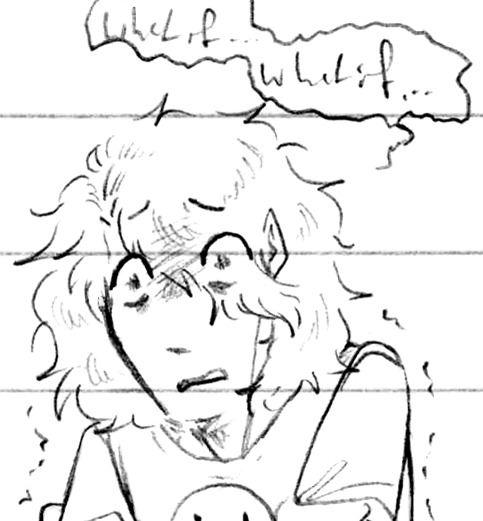


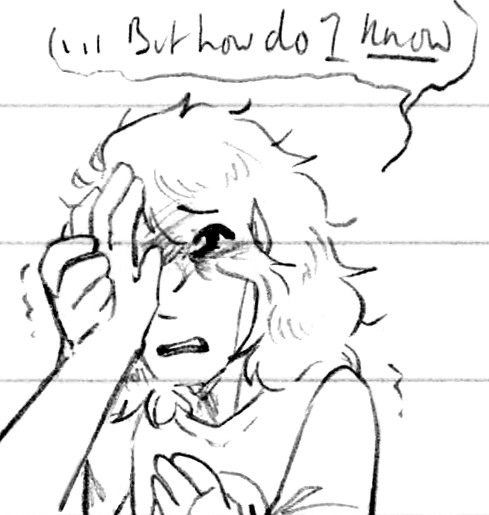

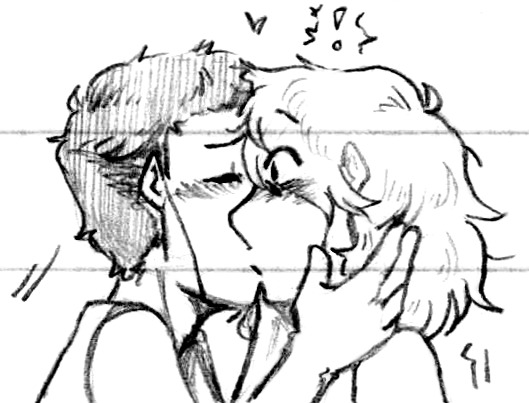
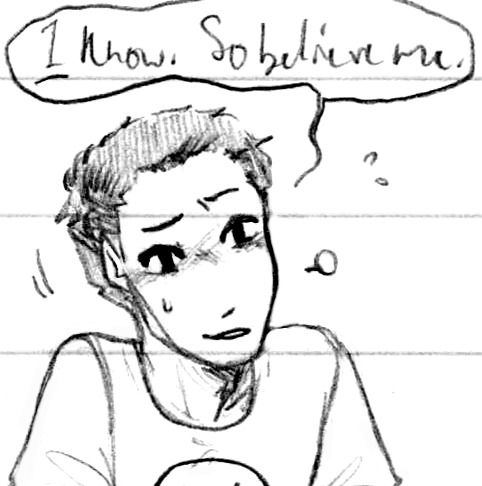
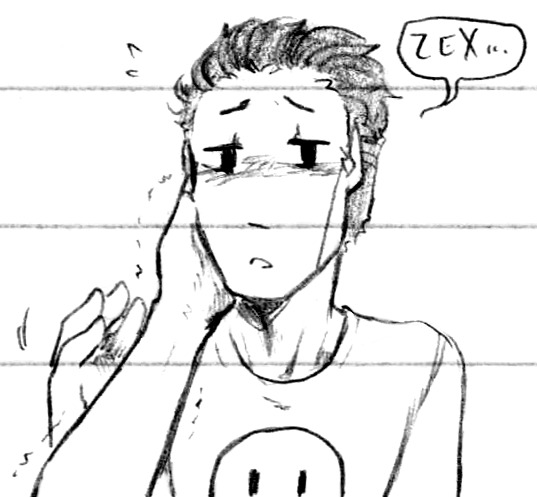
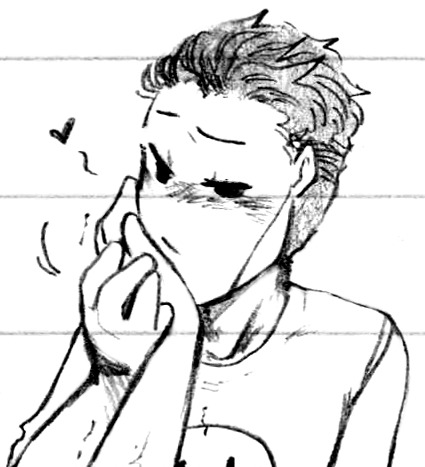
Pivotal bright spot (Patreon)
#Doodles#SCII#Helix#ZEX#The Captain#Hhhhhh <3#I am once again ''Who am I without you'' - ZEX relies on Zelnick to affirm who he himself is! His Captain is a huge comfort!#It's the codependency for me <3#The way Zelnick comforts him is so sweet ;; He can be quite attentive! When he chooses to be hehe#He's hesitant and concerned but overcomes it to give ZEX what he needs in the moment ahh he's deserving of being a leader ♥#Like covering his eye for him - and repeating back his greeting! ;;;; How many times has ZEX introduced himself that now it's repeated back#How many times has he said those exact words so confidently that Zelnick can repeat it back to him#So confident in his identity until it's all brought into question - too many pieces that align Just So to know one way or anything!#How would his human love know so many details - but such specific details are concerning as well! What's real and what's not!#What's experienced and what's mentally real - or false! There's so many tricky mental traps set agh it's so good <3#It's so interesting how their character flaws interact with their self-assuredness hehe <3 Zelnick is brash and bold!#ZEX is careful and prideful - so which takes a harder hit in matters of the mind? ZEX is at a disadvantage in Max's body of course#Hghh there's so much about this scene that's so good tho ah#ZEX's worries of his own level of self-delusion bleeding out into accidentally telling lies - he's quite honest! Mostly ♪#But here it's all just deep concern - not of Trying to manipulate but being so far gone that he can't Help but do so! Being out of control!#Of course that would be very scary for him :( And of lying to himself? The kind of thing that's wholly repulsive to him </3#Ughhh this scene breaks my heart because they really love each other and ZEX wants him and needs him but I know what will happen ;;#At least they're able to give each other a bit of comfort in the moment - whether it's true or not (it is true haha) the contrast helps#Even in Max's body and even unsure of himself getting to hold his human - this human - feels real and right <3#He's still worried afterwards of course - takes something convincing to pull him out of it! - and Zelnick continues to comfort him <3#I love palm kisses as well ugh they're so sweet ;; <3 What a lovely way to show his solidarity! Hehe ♥
10 notes
·
View notes
Text
GUESS WHO FINALLY CAUGHT UP W THE BLLK MANGA 🤩
#thoughts atm…kurona is so cute idek where he came from but he’s literally adorable#i NEED karasu omg he’s so fine i want to [redacted] [redacted] until we [redacted]#jkjk ofc#also i still love nagi he is my beautiful special princess#i rlly like reo a lot too!! but i don’t really like nagi and reo together.#they as a duo are just kinda boring to me which ik is an unpopular opinion but i must live my truth#and my truth is that they are more compelling interacting w other characters than w each other#wait also when isagi pulled up w the guns i lowkey lost it LMAOAO what even was that#barou continues to be cunty 🤩 i do feel like he looks better as the manga goes on though fs#i wish anri didn’t have so many fan service scenes 😢 but what can you do ig#me and sae are enemies because he has a dumbass haircut but i also can’t stop watching edits of him so like#mayhaps an enemies to lovers arc is incoming idk#rin needs therapy DESPERATELY somebody stop that boy from touching a soccer ball until he’s had at least 8 sessions#because the way that whole mental breakdown in the u20 arc was just not addressed is insane#and kaiser needs to use his million dollar salary to go to a hairstylist instead of letting ness do it#because whatever tf he has going on is certainly…a choice…#okay i think that’s all!! for now at least#m’s thoughts
8 notes
·
View notes